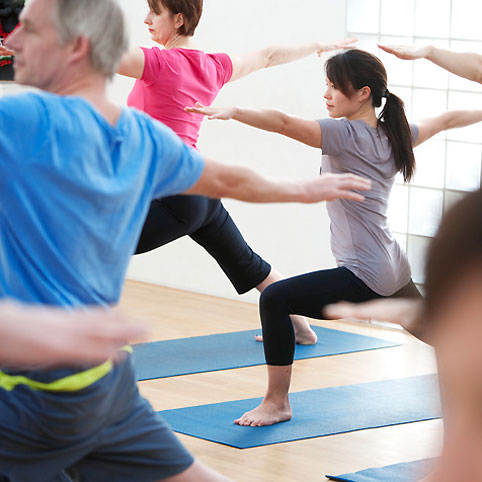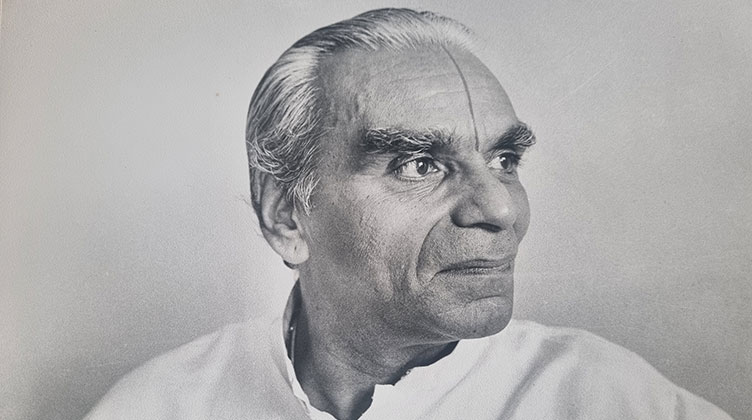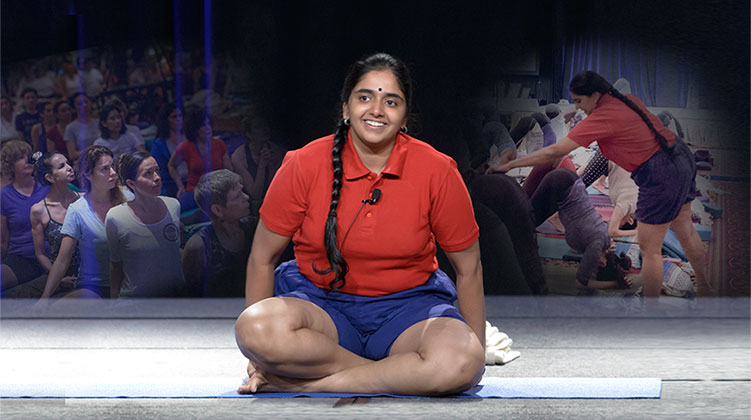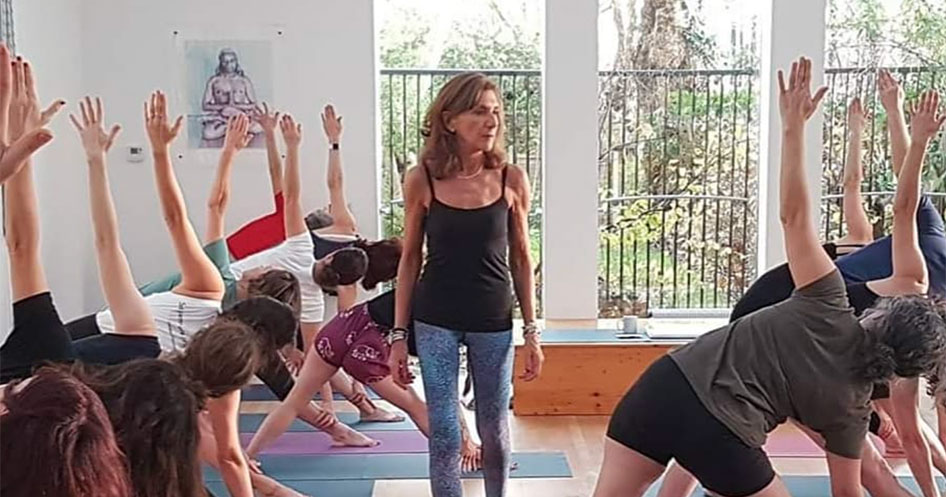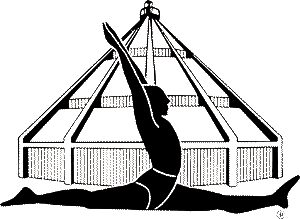
Mark Tully (former BBC’s India correspondent) visited Pune in 1999. The result of this visit was a memorable interview with BKS Iyengar and the BBC Radio 4 production “Head to Toe“. The BBC producer, Vanessa Harrison, has kindly given some of the interview transcripts to Dipika. This is a section of the interview with Geeta Iyengar who published her yoga book for women, “Yoga: A Gem for Women”, in 1983.
Now, you’ve written a highly-praised book, called “Yoga: A Gem for Women” and it was really Guruji who pioneered the teaching of yoga to women, wasn’t it? Why had women not been doing yoga before this? Was it a social custom that they didn’t do it?
Geeta Iyengar: I think so. Firstly it was a social custom and they were feeling shy. Domestic life was such that they were all the time tidying the house, in the kitchen and perhaps they never came out. In my book I specifically mention that India was not independent in the old days, invaders were attacking India all the time and women’s lives were not safe. Obviously when it was not safe, they had to be in the house and there was no chance for them to find out about any other things. Even education was brought down to such a low level in those days. Earlier in Vedic times there were ladies who were practising yoga and studying Vedas but later we don’t find that; there was a big gap between men and women. But in more recent times this gap made women feel that they were not supposed to do anything except to get married, be in the house, look after the family, cook meals and look after guests.
Now, do you think that yoga has a special relevance for women then?
Geeta Iyengar: I think a great lot. Yoga can definitely help ladies in different ways. It’s not only health-wise, but her mind is also very complicated. As a woman she is always with the family and friends around her. Really she has to divide herself in different ways, when she has to help and go out, to bring up the family. I feel, in a sense, that her body and mind get affected quickly because she has got a power, a strong willpower, to do something and with that willpower she puts all the effort there, so much effort that she then feels physically and mentally low. When she feels like that, then something is required for her to build up her own strength once again. I find that yoga definitely can play a great role, especially when she has to go through the different stages of her life as there is a great change in her compared to men. Men don’t find that kind of change occurring in their physiological body, glandular level or as far as the hormonal balances are concerned. It affects her mostly at a later age. In her case, she has to build up her energy throughout her life and that’s why I find yoga essential. Emotionally also sometimes; women are strongly emotional people. If she is hurt somewhere, then she feels suddenly so low and a kind of inner support is required, a moral support is required. When they lose their self-respect, they need the art to build them up strongly again, with a strong morale Yoga brings them up again.
You now have a lot of women teachers around the world, don’t you?
Geeta Iyengar: We have now a lot of women teachers.
Is there any difference between a woman teacher and a man teacher?
Geeta Iyengar: Oh, that’s a great question!
I shouldn‘t ask these sorts of questions, but there we are.
Geeta Iyengar: That’s true. In a sense when women suffer themselves, they feel that help is definitely required. If I suffer, I hope that somebody will help to build me up. I also help others who are in need. Whereas – how do I put it? – a man has got his own ego, so men don’t calculate when they have to help or give services. They won’t think of that at that level. They always want something out of it, whereas women will sacrifice. I think to sacrifice is her very inner nature. Very rarely do you find a woman who doesn’t want to sacrifice. But in the case of men, you find they have got their own strength. They have got their own ego and that’s why, you know, they will fight anyway. Every problem is their own problem, nobody should interfere. Women, when they have a problem and they can solve it, they also want to help others to solve their problems. This makes women more sympathetic teachers, more understanding teachers. I think so, I think so! At an emotional level they are different, completely different. I see that in my classes if I ask a woman to help some patient, she will put all her strength in that, whereas male teachers, they will just do something and go and leave. They are often not bothered to see whether that person is comfortable and feels all right, even with a male student. They don’t want feedback; whereas women always want to have feedback immediately to see how the student is feeling.

So do you think that you are a more sympathetic teacher than your father?
Geeta Iyengar: [Laughter]. Oh God, I don’t know. In Guruji’s case, he is a man, he’s very strong, so his approach is like a man only. When he wants the students to do something in a certain way, he demands that. He is the man and they should react to it and show him back what he asked them to do. They should obey his commands, really! Yes, yes, so that part is there but I would say he has compassion. But as a man he definitely demands things to be done at once and to do them in a certain way. Then he is very strict about it, but when he has to reach that person, that part is completely full of compassion. He knows the problem of the students. Many people think that because he is so strong or he just demands, he hasn’t got the compassion. This is wrong! He has such great compassion and that’s why he found out so many methods, so many ways to help. He knows the exact problem that is hidden, which the student may not even know, so he demands a lot from the person, but the compassion is definitely there. And I would say, compassion is not just a verbal compassion, by speaking something sweetly in a mild manner. That doesn’t mean that a person is getting compassion. In his case, when Guruji realises that this is not the result he wanted, he immediately shows the student another way. He opens a new avenue and that is his way of showing compassion. He is a man, and having the nature of man, but yet that compassion is there.
Let me put it another way. You see, when a person becomes a teacher – I won’t say just a teacher but a guru who gives guidance – that guru will always have that motherly affection. Every teacher is not a guru, so that motherly affection will not be there. But in his case, he is not just a teacher, he is a guru! His words might be strong, he might be looking very aggressive, but definitely in his touch, in his approach, he has got a motherly touch. That is the difference. I won’t say that all male teachers don’t have this, but most will have to develop it.
This article was first published in Dipika, the journal of Iyengar Yoga London, Issue No.51, July 2019.
Blog categories
Become a member
Join our community to get reduced class prices, early booking for events and workshops plus access to the studio for self practice.
Recent news and articles
Origins of the Modern Yoga Mat
24 October 2024|
2024 Convention – Group Livestream Event
7 March 2024|
The First Public Iyengar Yoga Class in the UK
22 November 2023|
NEW Hybrid Classes
5 September 2023|
